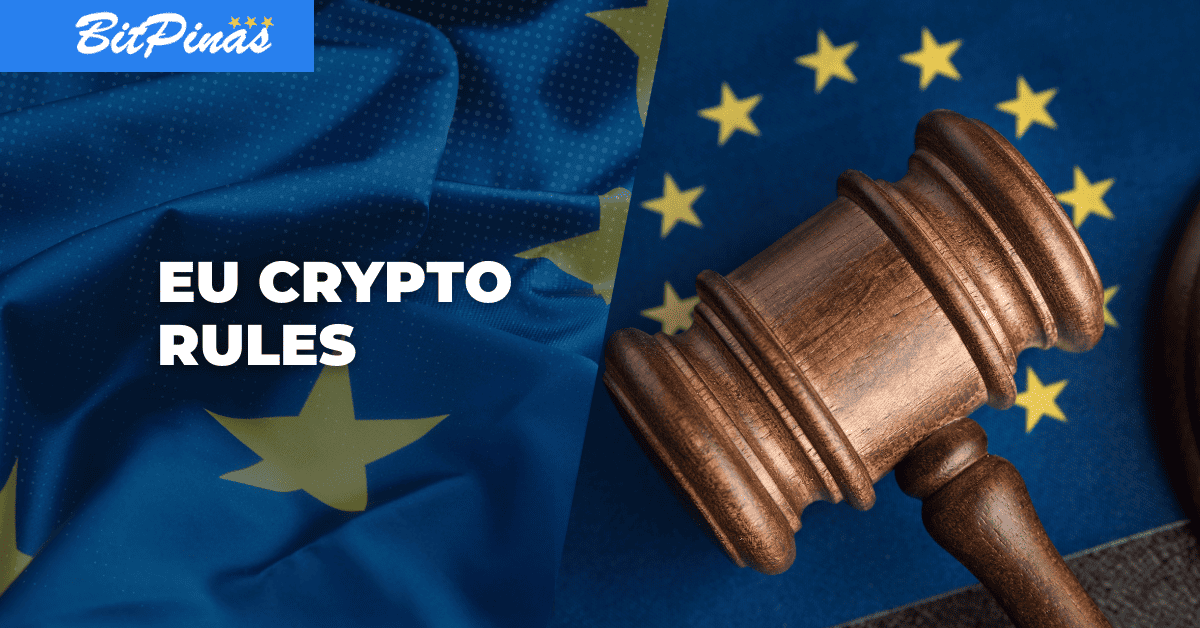Europe Approves New Crypto Rules
The Markets in Crypto-Assets (MiCA) regulation aims to regulate the issuance and provision of crypto assets & stablecoin services in Europe.

Subscribe to our newsletter!
Editing and Additional Reporting by Nathaniel Cajuday
- The European Union (EU) has established the Markets in Crypto-Assets (MiCA) regulation, which aims to regulate the issuance and provision of crypto assets and stablecoin services.
- The European Parliament has also added the crypto industry to its currently existing Transfer of Funds Regulation (TRF), requiring crypto operators to verify the identity of their customers to prevent money laundering.
- In the Philippines, regulation on cryptocurrencies is still non-existent, despite the increasing number of crypto owners and investors. But SEC Commissioner Kelvin Lee shared last 2022 that the Commission is closely studying the moves of the EU in regulating digital assets.
Known as the “crypto-friendly continent,” the 27 nations of the European Union (EU) are set to have a comprehensive crypto law as lawmakers in the alliance make a new licensing regime focusing on the crypto industry—the Markets in Crypto-Assets (MiCA). It is the first major jurisdiction in the world to focus on digital assets.
Aside from MiCA, the European Parliament—one of the law-making institutions of the EU—also agreed to have a Transfer of Funds Regulation (TRF), a separate law requiring crypto operators to identify their customers to prevent money laundering.
The EU countries are Austria, Belgium, Bulgaria, Croatia, the Republic of Cyprus, the Czech Republic, Denmark, Estonia, Finland, France, Germany, Greece, Hungary, Ireland, Italy, Latvia, Lithuania, Luxembourg, Malta, the Netherlands, Poland, Portugal, Romania, Slovakia, Slovenia, Spain, and Sweden.
Markets in Crypto-Assets (MiCA)
With a majority vote of 517-38, with 18 abstentions, the establishment of “Markets in Crypto-Assets” was finalized during a meeting on April 20, 2023. First introduced in September 2020, MiCA is expected to start operations in 2024.
The MiCA Regulation is set to regulate the issuance and provision of crypto assets and stablecoin services, with the primary objective of facilitating the regulation of distributed ledger technology (DLT) and virtual assets within the EU while also safeguarding the interests of users and investors.
“This puts the EU at the forefront of the token economy with 10 000 different crypto assets. Consumers will be protected against deception and fraud, and the sector that was damaged by the FTX collapse can regain trust. Consumers will have all the information they need and all underlying risks around crypto-assets will have to be monitored. We secured that the environmental impact disclosure will be taken into account by investors in crypto assets,” said Stefan Berger, lead MEP for the MiCA regulation.
He also pointed out that the regulation has given the EU a competitive edge, as the crypto-asset industry within the region now benefits from regulatory clarity that is absent in countries like the US.
Transfer of Funds Regulation (TRF)
With 529 votes in favor and only 29 against, the European Parliament passed a distinct piece of legislation called the “Transfer of Funds Regulation.” This law mandates crypto operators to verify the identity of their customers to prevent money laundering. Fourteen members abstained from voting.
First proposed in July 2021, the TRF will start applying 18 months after the regulation enters into force—January 2025.
Initially, the TFR was a legal framework that governed electronic fund transfers within the EU to prevent financial crime and safeguard the stability of the financial system, setting out requirements for payment service providers to ensure transparency, security, and the prevention of money laundering and terrorism financing. The regulation also established oversight and enforcement mechanisms by national authorities and provided for sanctions for non-compliance.
However, in the revised version, the requirement for payment service providers to include details of the sender and receiver will now also cover crypto assets. This change is in line with the recommendations made by the Financial Action Task Force (FATF) regarding wire transfers and virtual assets.
Crypto Regulation in the Philippines
Although the number of cryptocurrency owners and investors has significantly increased in the Philippines since the 2021 market bull run, regulation of digital assets in the country is still non-existent.
However, a July 2022 statement by Securities and Exchange Commission (SEC) Commissioner Kelvin Lee revealed that the Commission is closely studying the moves of the EU in regulating digital assets.
The Commissioner also disclosed last month that the regulatory agency has already created a regulatory framework for cryptocurrencies in order to offer more protection and security to investors in the Philippines, but the release was postponed due to the FTX collapse. As of this writing, the said draft has not yet been publicized.
In August 2022, the country’s financial regulators, the Bangko Sentral ng Pilipinas (BSP) and the Securities and Exchange Commission, asked the legislative body to draft bills to manage cryptocurrency, non-fungible tokens (NFT), and other aspects of the digital space. The central bank expressed wanting to draw lines on the rules on digital assets, while the SEC requested to have specific jurisdictions regulate the said assets. Currently, there is still no law implemented to answer these pleas.
However, the crypto industry in the country is still a little bit shaken as some top officials from the government have made negative comments about crypto.
Just before 2022 ended, Senator Win Gatchalian even called crypto just a glorified casino. And that it is no different from casinos because they just made it fancy by mining coins, but at the end of the day, it’s a glorified casino.
Even BSP Governor Felipe Medalla, who is the monetary chief of the country, said that he does not want to call it “cryptoCURRENCY” as well because it has very little use for actual payments, especially when the price is so volatile, stating that he was not keen on regulating cryptocurrency as the digital asset is a scheme based on the “greater fool theory.”
He also questioned “what social good” Bitcoin achieves when it’s used to evade the government, but mockingly acknowledged that “if you are in a country where the government itself is the problem, maybe it does.”
Consequently, as local crypto taxation is still not regulated in the country, Divly’s Global Cryptocurrency Taxation Report reveals that only 0.03% of Filipino crypto traders, hodlers, and investors paid their taxes earned from crypto in 2022.
This article is published on BitPinas: CRYPTO MILESTONE! European Union Approves New Regulatory Scheme for Crypto, Adds Crypto in Fund Transfer Rules
Disclaimer: BitPinas articles and its external content are not financial advice. The team serves to deliver independent, unbiased news to provide information for Philippine-crypto and beyond.



